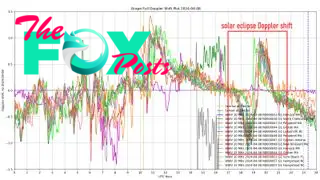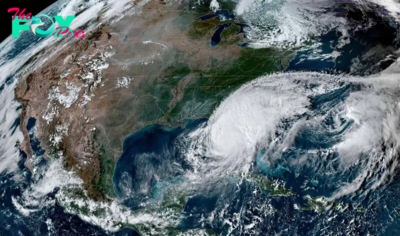Science
Global 'time signals' subtly shifted as the total solar eclipse reshaped Earth's upper atmosphere, new data shows
As millions of people looked up to the sky to see the moon temporarily (and completely) block out the sun during the April 8 total solar eclipse, the extraordinary cosmic event also shifted invisible "time signals" being beamed from the U.S. across the globe, new data shows. But don't worry, these altered signals did not result in any changes to the time we observed during or after the event.
The shifted time signals came from the WWV radio station — a National Institute of Standards and Technology (NIST) facility located in Fort Collins, Colorado, that monitors and broadcasts high-frequency radio waves.
WWV, which is jointly operated by NASA's Ham Radio Citizen Science Investigation (HamSCI), constantly broadcasts a special signal embedded with "digital time codes" to millions of receivers around the world. Devices that pick up this signal interpret the digital codes embedded within the transmission and use them to stay in sync with NIST's atomic clocks, which serve as the gold standard for all U.S. timekeeping.
Related: 6 strange things observed during the April 8 solar eclipse: From doomed comets to 'diamond rings'
However, in order to do this, the signal must be bounced off the ionosphere — the upper part of the atmosphere between 50 and 370 miles (80 and 600 kilometers) above the Earth's surface, where gases are turned into plasma, according to the National Oceanic and Atmospheric Administration. And during the eclipse, the ionosphere was slightly altered as the moon's shadow raced across the U.S. at more than 1,500 mph (2,400 km/h).
As a result, the frequency of the signal being bounced off this part of the atmosphere was shifted slightly, Spaceweather.com initially reported. Similar frequency shifts were also seen in other radio signals sent or received by amateur radio operators across the country, HamSci reported.

Luckily, the change to the WWV signal's frequency was so small that the digital time codes transmitted by the radio waves were unaltered, meaning devices that rely on the signal to keep time were unaffected, according to Spaceweather.com.
-

 Science2d ago
Science2d agoInside Capitol Hill’s Latest UFO Hearings
-

 Science2d ago
Science2d agoYou Won’t Want to Miss the Leonid Meteor Shower. Here’s How and When You Can See It
-

 Science3d ago
Science3d agoHere’s What Trump’s Win Means for NASA
-

 Science6d ago
Science6d agoWhy Risky Wildfire Zones Have Been Increasing Around the World
-

 Science6d ago
Science6d agoIt’s Time to Redefine What a Megafire Is in the Climate Change Era
-

 Science1w ago
Science1w ago4 Astronauts Return to Earth After Being Delayed by Boeing’s Capsule Trouble and Hurricane Milton
-

 Science1w ago
Science1w agoThe Elegance and Awkwardness of NASA’s New Moon Suit, Designed by Axiom and Prada
-

 Science1w ago
Science1w agoSpaceX Launches Its Mega Starship Rocket. This Time, Mechanical Arms Catch It at Landing


























